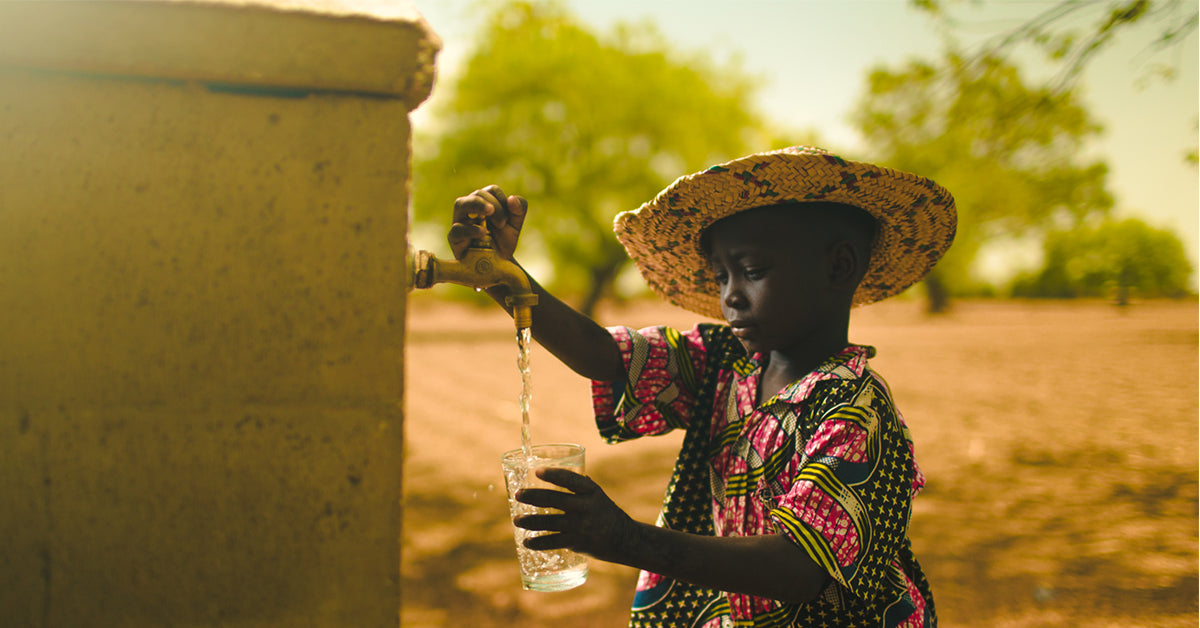
Scott Harrison
Founder, charity: water
There’s really no other way to say it: Scott Harrison has lived a fascinating life. From a difficult childhood helping take care of a sick mother, to a life of debauchery as a NYC nightclub promoter, to founding charity: water and not only changing, but saving the lives of people in underserved communities around the world, Scott has a story to tell. And a challenge for you to help him change the world, too. The next time you have easy access to clean water for your cuppa tea, think about Scott and the work he’s doing to provide that same access that we take totally for granted to those who have never had clean water a day in their life.

Image Credit: Blake Curtis
Harney: So, we usually start these interviews with “Tell us a little about you. Where are you from, educational background, where you live, family, etc.” But your story is so vast, it’s hard to know where to start. Maybe with family and childhood first? Then fast forward to your family now?
Scott: I grew up an only child in Philadelphia, in a very conservative Christian household. When I was four, my mother was poisoned from a carbon monoxide leak in our home, and from that point forward she became an invalid - allergic to the world. I spent most of my childhood in a caretaker role, until I left home at 18.
Fast forward to my family today, I have two young kids with my wife, Vik, who was formerly charity: water’s Creative Director and our first employee. We both lived in New York City for 26 years, but we’re currently living the rural life in a farmhouse in Pennsylvania, where we relocated after COVID-19 hit with parents and grandparents, and charity: water transitioned to remote.

Harney: Rewinding back: your first big adventure was going to New York City when you were 18. Where did you go to school and what did you study?
Scott: I moved to New York City as an act of rebellion against my conservative upbringing and to explore life without rules or boundaries. I went to NYU and barely graduated with a communications degree, though I spent most of my time partying for a living as a nightclub promoter, living off campus.
Harney: How old were you when you started being a nightclub promoter, and how did you get into the business?
Scott: Shortly after moving to NYC, I discovered that there was this job called a nightclub promoter where you could get paid to drink alcohol for free, if you could get the right people to the right parties. I spent the next decade climbing nightlife’s social ladder, working at more than 40 clubs over that time. I pretty quickly descended into a selfish, debaucherous lifestyle, picking up practically every vice you could imagine.
Harney: At the age of 28, you had an epiphany. What did you do next? How did it change your life?
Scott: During a New Year’s Eve vacation to Punta del Este in Uruguay, I had what I can only describe as a crisis of conscience and faith. I was surrounded by beautiful people in a luxurious compound. I had a Rolex, a BMW and a grand piano in my midtown loft. My girlfriend was on the cover of fashion magazines. But I realized I was totally empty inside. I was emotionally and spiritually bankrupt, and I had somehow become the worst person I knew. I needed to do a complete 180, and I asked myself what the exact opposite of my life would be. A few months later, I sold my possessions and started applying to volunteer positions for humanitarian missions around the world. After being denied by a bunch of groups who didn’t know what they’d do with a nightclub promoter, one place finally said they’d take me - provided I paid them $500 a month to volunteer and was willing to live in post-war Liberia. I said yes and never looked back.

Harney: Tell our readers about when you discovered your passion to provide people with clean water, the enormous impact you realized clean water had on people’s lives and how charity: water began.
Scott: While on the hospital ship in West Africa, I discovered that the underlying cause for so many of the horrible diseases we were treating was dirty water. On my trips into villages, I was horrified to see people drinking brown viscous water I wouldn’t even let an animal drink. I saw children drinking dirty water from swamps alongside livestock. And I saw mothers losing their children to diarrhea because of the bacteria that had been in the water they drank.
While it’s unthinkable for us, in these areas diarrhea from dirty water is not only incredibly common—it’s lethal. And general lack of sanitation creates breeding grounds for bacteria which can cause other terrible diseases like cholera, typhoid and dysentery. These illnesses contribute to why dirty water is so dangerous – 43% of water-related deaths are children under five simply because their bodies aren’t strong enough to fight once they get sick. Access to clean water can save around 16,000 lives every single week.
And it goes beyond that: the water crisis is, at its core, a women’s issue. Without access to a clean water point, it’s the job of the women and girls to go collect dirty water for their families - something that can often take up to four hours a day. When a community gets clean water, girls can get an education, women can start their own businesses. They get their lives back.
After learning all this, I knew I had found the issue I wanted to dedicate the rest of my life to. So after two years on the ship, I returned to NYC to start charity: water.

Harney: So far, you’ve funded over 51,000 water projects in 29 countries, helping over 11 million people drink clean water who had no access to clean, safe water before. How do you select the communities your organization brings clean water to?
Scott: In the early days when our organization was tiny, it was pretty haphazard. We’d have money for 10 water projects, we’d find a local partner and ask them to pick the best 10 spots. Now, there are more than 1,000 local workers around the world supported by charity: water, and a dedicated team in NYC working around the world on multi-year strategic plans using GIS data and satellite coordination with other NGOs in the area.
For just one example, in Malawi there was a community that was actually cut off from the roads by a huge ditch in a gully, and we needed to bring clean water to communities on the other side of this big gully. This community found out about our project and the logistical challenges and told our local partner that they would build the road that was needed for our rig to get through themselves, moving rocks by hand and small shovels. So they painstakingly built that road to bring clean water to their community. That’s how massive the impact of clean water on these communities can truly be.
Harney: Rather than bring people from the U.S. to drill and build wells or implement other technologies in these villages and communities, you partner with companies from the countries where the work is being done to be your boots on the ground. How do you select your partners, and what impact does that have on the local economy as well as relationships with their own countrymen and women?
Scott: Right from the start, it was extremely important that we partner with local organizations on the ground in each country to implement the projects. I believed this was the only way our work would be culturally appropriate and sustainable in the long run. Our programs team carefully selects experienced local partners who understand the unique challenges and needs in each region, and who are experts at identifying and implementing the right solution — whether that’s a drilled well, piped system, rainwater catchment or filtration system. This approach also ensures that the projects are sustainable and community-owned and led. Our local partners then work closely with local governments and each community to make sure they’re invested and to provide training on project maintenance as well as proper sanitation and hygiene practices, to ensure they’re getting all the benefits of clean water.

Harney: How long does a project take, from identifying a location to planning to implementation?
Scott: Once the funds are sent to the field, it usually takes about 18-21 months for a project to be complete. This timeline includes planning, implementation and the community education piece. It also includes auditing quality and expenditures. But our work doesn’t stop when this part is done. We’re committed to monitoring, evaluation and maintenance to ensure projects are sustainable and water keeps flowing for years to come.
Harney: What kind of technologies do you put in place in what are likely some very remote geographical areas in underserved countries?
Scott: We consider ourselves solution-agnostic, which means our local partners carefully evaluate the needs of each community, taking into account existing water sources, terrain and population into account when choosing a water solution. Today, we fund more than 10 different solutions across the portfolio. These solutions sometimes capture and treat available water, such as rainwater catchment systems, gravity-fed systems and biosand filters, or can be more elaborate builds such as drilled wells or piped systems that supply water from deep below the ground to different community tap stands.

Harney: How do you help ensure that these projects are sustainable? What role do the people in the communities themselves play in taking ownership?
Scott: Making sure that these projects continue to work was something that was absolutely critical to me, because getting clean water and then losing it again if a project stops working is devastating. Every community that receives a water project is trained on maintenance and performing small repairs. We also train teams of mechanics to help with larger repairs and have a robust monitoring and evaluation program. But the thing that I’m most excited about is our remote-sensor program. In 2015, we received a $5M grant from Google to develop first-of-its-kind sensor technology that can monitor water flow on our projects in real-time. Basically, connecting wells to the cloud to self-report their functionality. This was a huge development because most of our projects are extremely remote, and site visits require a ton of time and resources. We now have thousands of sensors in the field transmitting water flow data to the cloud and alerting us if a project stops functioning. This allows us to immediately dispatch mechanics to get clean water flowing again as quickly as possible.

Harney: Your business model allows 100% of donations to fund water projects, not infrastructure. This model goes hand hand in hand with your other mission, to change people’s negative perceptions about charities. How are you doing that?
Scott: When I started charity: water I saw a study that said 42% of Americans distrust charities, and another more recently reported that 70% of Americans believe charities waste their money. So I wanted to take a different approach, and decided that in addition to solving the water crisis, we would have a vision to reinvent charity. We made a bold promise that 100% of all public donations would go directly to funding projects in the field, and we’d prove each project with GPS coordinates and photos on Google Maps, so people would always know where their money was going.
To make this 100% model work, we brought together a small group of visionary “investors” and entrepreneurs whom we call The Well. These 140 individuals and families cover all our overhead, staff salaries and the million little things that make our office work, including staff travel to the field (when it’s safe to travel) and postage stamps. That allows us to use 100% of public donations to directly fund water projects.

Harney: Birthdays play a special role in charity: water. Please share why they’re important and how our readers’ birthdays can make a difference.
Scott: I actually launched charity: water with my own birthday fundraiser. Drawing on the skills I had learned from 10 years in the nightlife industry, I decided to throw a party and charge people at the door. I raised $15,000 and sent 100% of that to Uganda to fund our first-ever water projects.
This idea eventually led to the birth of our fundraising platform. We wanted to create a way for anyone to turn their birthdays into generous moments and use them to raise money for clean water. Anyone can easily create their own campaign to share with family and friends, and every dollar they raise will be used to build clean water projects. You can learn more at charitywater.org/birthdays.
But, the number one way people can make the biggest possible difference is by joining The Spring, our monthly giving community. We launched it a few years ago on our 10th birthday, and it has now grown to more than 50,000 people in 100+ countries, people giving whatever they can each month to help get us closer to ending the water crisis.
Think Netflix or Spotify, except that 100% of donations go to benefit others by providing access to life’s most basic need (clean water) and not ourselves. We’re so grateful for this growing generous community, and we’re constantly working on new ways to celebrate them and connect them to their impact through unique stories and behind-the-scenes content.
I’m incredibly passionate about this community, and we just hosted our first-ever Spring virtual event, with many more to come.

Harney: In addition to everything else you’ve accomplished, you’re the author of the New York Times bestseller Thirst. Why was writing that book important to you? What do you hope it accomplishes? And did you learn anything in the process?
Scott: In my memoir, Thirst, I share my journey and charity: water’s story in a more open and vulnerable way that I’ve never done before. It’s my hope that my book will help encourage readers to summon the courage that lies within each of us, to take bold leaps of faith and to find greater passion and purpose in their own lives.
It was also important to me to donate the full author advance, and all future proceeds to support the work of charity: water, so as people bought the book in any format, they’d be also moving the work and mission forward.
In many ways, the process of putting the book together was like the journey of building charity: water. It sometimes felt totally crazy, and at other times felt like it just wasn’t working. But ultimately, it was a rewarding process, and I’m incredibly proud of the finished work. It was certainly painful to look back and relive the mistakes I made and some moments where I was ashamed of my actions, but was also a joy to relive the excitement and accomplishments of our amazing community who have helped us to achieve transformational change for people in need.

Harney: You’ve said that your favorite quote is, “Don’t be afraid of work that has no end.” (Kinda like our questions!). Why does that quote resonate with you? Does it motivate you to continue your goal of making sure everyone on the planet has access to clean water?
Scott: I believe if you can reject apathy and embrace a life of service to others, tackling problems big and small and seeking to end needless suffering, you’ve signed yourself up for a never-ending work. And that’s okay, we shouldn’t shy away from things because they seem too hard. Solving the water crisis may seem impossible, but I have seen the faces of the people who we have been able to help by giving them clean water for the first time in their lives, and the work is worth it.
Harney: Since water is an integral part of the tea business, we’re certainly 100% behind your work. To ask the hardest question yet: at the beginning or end of a long day, do you or your wife enjoy a cup of tea? Any favorite Harney flavors or something you’d like to try?
Scott: If you walked into my office in NYC, you’d see a box or two of African Autumn above my desk. It’s my favorite Harney Tea, and I love introducing others to it! We’ve recently gotten into Jasmine tea, and I’m excited to try Dragon Pearl!
Interested in learning more about Scott’s work through charity: water? You can read more on their website, Twitter, Facebook, Instagram and YouTube channel. We support the work Scott and his team are undertaking and the difference they are making around the world, and we thank him for taking time out of his incredibly busy schedule to talk with us. All photography was provided by Scott.





4 comments
Kathy
What a wonderful and inspiring story! How one person with a vision started, and then with the help of others, has changed and helped so many lives around the world! It is so refreshing to read a very positive story in these troubling times. Scott, kudos to you and God’s Blessings! You are helping to change the world!
What a wonderful and inspiring story! How one person with a vision started, and then with the help of others, has changed and helped so many lives around the world! It is so refreshing to read a very positive story in these troubling times. Scott, kudos to you and God’s Blessings! You are helping to change the world!
Pam L.
Hi,
I’m a loyal customer of Harney & Sons. I’ve also been a fan of charity:water for many years. This was a fantastic blog post. In it, you mention Harney & Sons supports charity:water. Would you elaborate on that more? Do you support as in believe in what they do, or support as in contribute to charity:water? I’d be thrilled to know that my purchases are helping this important charity.
If you aren’t currently making a financial contribution, would you consider a charity:water fundraising month, with a % of each purchase, up to a certain amount, being donated to charity:water? I’d absolutely get behind that fundraiser with my own purchases.
Thanks for giving charity:water a feature on your blog!
Pam L.
Hi,
I’m a loyal customer of Harney & Sons. I’ve also been a fan of charity:water for many years. This was a fantastic blog post. In it, you mention Harney & Sons supports charity:water. Would you elaborate on that more? Do you support as in believe in what they do, or support as in contribute to charity:water? I’d be thrilled to know that my purchases are helping this important charity.
If you aren’t currently making a financial contribution, would you consider a charity:water fundraising month, with a % of each purchase, up to a certain amount, being donated to charity:water? I’d absolutely get behind that fundraiser with my own purchases.
Thanks for giving charity:water a feature on your blog!
Pam L.
Alma Elder
What an inspiring story about charity:water. Scott has made a big difference in the lives of people. I especially enjoyed reading about the follow-up on the cloud to ensure that these projects are maintained. Thank you for sharing.
What an inspiring story about charity:water. Scott has made a big difference in the lives of people. I especially enjoyed reading about the follow-up on the cloud to ensure that these projects are maintained. Thank you for sharing.
Diane B.
Wow! Something so simple to me here at home is being able to turn on the faucet and fill up my Brita filter. To think I’m concerned my tap water has a hard water taste and need to filter that out when at the same time there are people in other parts of the world who would laugh at my pickiness! I now feel pretty guilty about that! This was such an inspiring story to hear not only how Scott is making such a huge impact in people’s lives around the world but how in the process it saved him. Thank you for sharing his story! I plan on reading his new book and giving to charity:water.
Wow! Something so simple to me here at home is being able to turn on the faucet and fill up my Brita filter. To think I’m concerned my tap water has a hard water taste and need to filter that out when at the same time there are people in other parts of the world who would laugh at my pickiness! I now feel pretty guilty about that! This was such an inspiring story to hear not only how Scott is making such a huge impact in people’s lives around the world but how in the process it saved him. Thank you for sharing his story! I plan on reading his new book and giving to charity:water.